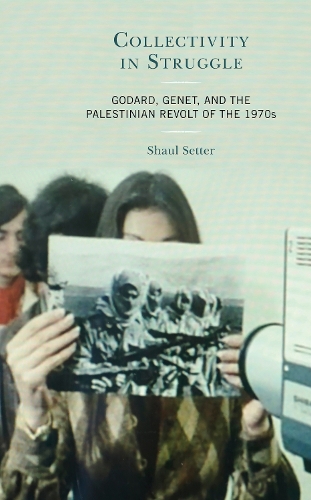
Collectivity in Struggle: Godard, Genet, and the Palestinian Revolt of the 1970s
(Hardback)
Publishing Details
Collectivity in Struggle: Godard, Genet, and the Palestinian Revolt of the 1970s
By (Author) Shaul Setter
Bloomsbury Publishing PLC
Lexington Books
15th January 2021
United States
Classifications
Professional and Scholarly
Non Fiction
Film history, theory or criticism
842.914
Physical Properties
Hardback
194
Width 161mm, Height 229mm, Spine 18mm
481g
Description
We live in a neoliberal regime that works to dismantle social institutions and eradicate forms of collective gathering. Over and against this state of affairs, Collectivity in Struggle revisits a crucial moment in recent history when the formation of collectivity sat at the heart of a radical emancipatory struggle and called for a creative endeavor, both artistic and political. The book examines two projects developed in the 1970s vis--vis the Palestinian revolt: Jean-Luc Godard's cinematic engagement with the Palestinian forces and Jean Genet's textual enterprise alongside them. Through an inverse reading that uncovers from the seemingly discrete and finalized artworks Godard's film or Genets bookthe process of their becoming, Shaul Setter explores the ways in which these projects portray and conceptualize the revolutionary stage of the Palestinian revolt, its abrupt end, and two different modes of prolonging it. Concentrating on their formal experimentation, their potentiality for collective enunciation, their conflicted positioning on the threshold of colonial European culture and the hidden Semitic languages inscribed in themSetter claims that these two projects insist on the writerly aspects of revolutionary political action.
Reviews
Recalling and invoking the artistic-political projects of Godard and Genet as mediating forces in the ongoing Palestinian struggle against superpowers and imperialism, Shaul Setter invites us to go beyond the melancholic gesture of declaring these interventions as failures. His careful engagement with the texts and with their collective revolutionary potentiality is presented as an alternative to an otherwise limited identitarian politics: liberal or radical. Setter's returns us to Genet and Godard, as well as to Palestine by reviving a mode of political engagement that may have failed to actualize in the past, but can and must still be envisioned as a historical potential that has not yet caught up with the present.--Gil Hochberg, Columbia University
This book is a unique piece of scholarship. It is interdisciplinary in a very creative manner and offers a special unique view on the year 1968 in world history. It manages to create connections where there seems to be none, resisting rigid disciplinary boundaries, putting together East and West, France and Palestine. Setter rereads Palestine from France and rereads French intellectual artistic scene from Palestine. The book establishes, reads, and interprets the relations between politics and aesthetics, writing and doing, the word and the deed, creating links between aesthetical imagination and political action.--Raef Zreik, Tel Aviv University
Author Bio
Shaul Setter is a teaching fellow in the department of literature at Tel Aviv University.
